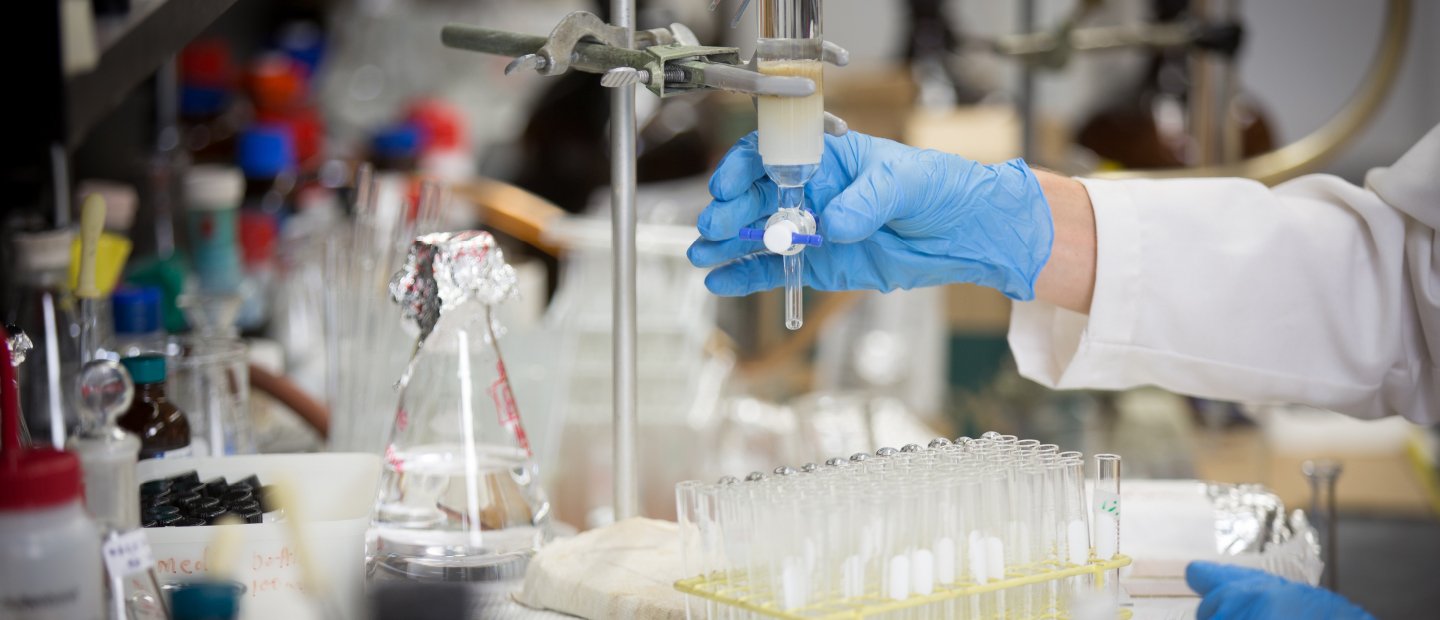
Research
The Department of Chemistry offers exceptional opportunities year-round for students, at both undergraduate and graduate levels, to participate in faculty research.
Undergraduate students that are interested and qualified can participate in faculty research for course credit (CHM 2995/4995/4996) and/or full-time during the summer. Students should feel free to discuss research opportunities with members of the chemistry faculty. If you are interested in research (in the Department of Chemistry) and do not know where to start, consider filling out a research questionnaire for advice on potential research mentors. Specific arrangements with an individual faculty member must be made before enrollment CHM 2995/4995/4996.
Graduate students in the Ph.D. and Masters programs have the opportunity to conduct research in any branch of the chemical sciences. Research should be discussed with a faculty research advisor of the students’ choice from the list below. Course credit may be earned in CHM 6995/9999.
Analytical
- Development of novel analytical methods
- Two-dimensional gas chromatography for analysis of trace species in air
- Analysis of biofuels
- Green electrochemical synthesis and energy conversion
- Advanced interface chemistry for sensors and biosensors
- Multifunctional composite materials
- Novel sensor technique and electrode array development
- Novel chemical and biointerface development for life science applications
- Characterization and applications of carbohydrates and conductive polymers
- Analytical applications of ionic liquids water quality monitoring and modeling aquatic microbial ecology
Biochemistry
- Molecular mechanisms of neuronal morphogenesis and disease
- Protein biochemistry and Drosophila genetics
- Advanced fluorescence techniques and drug development
- DNA replication, recombination, and repair
- Mechanisms of DNA unwinding and translocation by helicases
- Thermodynamic, kinetic, and structural understanding of protein-DNA interactions
Environmental
- Reconstructing natural hazards through sedimentology, palynology, and geochemistry
- Quaternary paleoenvironments
- Water quality monitoring and modeling
- Aquatic microbial ecology
- Harmful algal blooms and other emerging contaminants
- Biogeochemical transformation of soil organic matter
- Mineral-organic interactions
- Kinetics, mechanisms, and thermodynamics of organic reactions in geological and environmental systems
- Microbial wastewater treatment
Inorganic
- Synthetic models for metalloenzymes
- Nitric oxide releasing materials
- Development of synthetic nucleases
- Ligand design for asymmetric catalysis
- Tetrapyrrole and lanthanide coordination chemistry; synthetic methods
- Luminescence spectroscopy; solid state and near-infrared
- Therapeutic development in vitro; tissue culture and fluorescence microscopy
- Drug development in vivo; molecular imaging in small animal models
Organic
- Supramolecular chemistry
- Weak interactions
- Hybrid and biohybrid materials
- Novel synthetic methods
- Nucleoside (DNA/RNA) analogs
- Bioorganic and organometallic chemistry
- Heterocyclic and fluorine chemistry
- Synthetic organic and inorganic chemistry; developing synthetic approaches for photoactive materials
- Physical organic chemistry; elucidating structure-property relationships for hybrid materials
- Supramolecular chemistry; synthesizing novel hosts for anion recognition and sensing
Physical
- Reaction mechanism determination through infrared spectroelectrochemistry with a focus on greenhouse gases and inorganic catalysts
- Determining solvent effects on catalysis reactions
- Use of green solvents, such as ionic liquids, to optimize electrocatalytic reactions
- Relativistic quantum chemistry
- effects of spin-orbit interaction on the quantum many-electron problem
- the development of relativistic density functional theory and force fields with machine learning approaches
- Theoretical chemistry of heavy elements:
- actinide chemistry
- chemistry of superheavy elements
- Multi-scale modeling of significant medical isotopes:
- the behavior of Astatine-211, Radium-223, and Actinium-225 in complex systems and solution
- predictive models for rational design of radiopharmaceuticals for targeted alpha-particle therapy
Emeritus
Maria Bryant
- Computer modeling of intermolecular forces
Linda Schweitzer
- Environmental analytical chemistry
- Drinking water quality and treatment processes
- Mechanisms of radiation damage to DNA
- Electron spin resonance analysis for free radicals
- Quantum chemistry calculations of free radical properties and structure
The Department of Chemistry jointly hosts the Summer Undergraduate Research Program (SURP). Research fellowships for SURP are available for interested undergraduate students. This paid 10-week research program allows undergraduate students to participate in an authentic research experience in biochemistry, chemistry, or environmental science. The standard program runs from May-July, with each cohort member giving a short presentation to showcase their results at the close of the program. Additional information and application materials can be found on the Center for Biomedical Research website.
Tuition awards are available each semester to qualified students who elect undergraduate research within the Department of Chemistry. The Department of Chemistry has the following awards available to eligible students:
- The Jackie and Jerry Endowed Scholarship
- Lisa M. Flynn Chemistry Endowed Scholarship
- Professor Joel W. Russell Chemistry Endowed Scholarship
- The James Morrison Thompson Chemistry Scholarship
- Pure Oakland Water Scholarship
To apply, please use the Oakland University Scholarship tool. Recipients are chosen by the faculty of the Department of Chemistry.
Department of Chemistry
146 Library Drive
Rochester, , MI 48309-4479
(location map)
(248) 370-2320
fax: 370-2321







